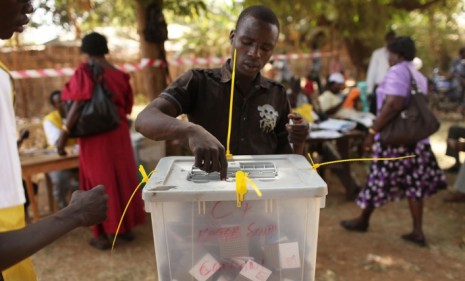Sudan's historic vote: An end to violence?
Southern Sudan may split off to form a new nation. Will this bring a halt to the killing that has plagued the region for decades?

A free daily email with the biggest news stories of the day – and the best features from TheWeek.com
You are now subscribed
Your newsletter sign-up was successful
More than 3 million voters in southern Sudan are going to the polls this week to make a momentous decision: Whether to break off from the northern part of the country and divide Africa's largest nation in two. And, The Economist says, after "five decades of the government in Khartoum alternating between neglecting and persecuting southerners, most are likely to vote for independence." (Watch an AP report about Sudan's election.) The decision will mark a turning point after the decades of strife — including the deadliest conflict since World War II — that have beset Sudan since its founding as an independent country in 1956. Will dividing the nation bring a halt to the bloodshed? Here's an instant guide to Sudan's epochal election:
Why is this necessary?
Because northern Sudan and southern Sudan have been in conflict ever since they came together. "Of all the bad ideas that colonialism left in Africa, Sudan was one of the worst," says William Finnegan in The New Yorker. From the beginning, the "relationship between the Arab Muslim north and the black, non-Muslim south always turned mainly on the slave trade — northerners enslaving southerners."
The Week
Escape your echo chamber. Get the facts behind the news, plus analysis from multiple perspectives.

Sign up for The Week's Free Newsletters
From our morning news briefing to a weekly Good News Newsletter, get the best of The Week delivered directly to your inbox.
From our morning news briefing to a weekly Good News Newsletter, get the best of The Week delivered directly to your inbox.
How long have the two sides been at war?
Even before Egypt and England granted the country independence in 1956, a civil war had begun between the north and south. After that conflict ended in 1972, peace was shattered by an even longer, second war that began in 1983, when leaders in the north declared Sharia Law. By the time that conflict finally ended in 2005, 2 million Sudanese were dead. The ongoing conflict in the Darfur region of western Sudan has also caused hundreds of thousands of deaths, but is separate from the north-south civil war.
How is the voting going?
For the most part, peacefully. International monitors, including former U.S. President Jimmy Carter, have reported a smooth process, albeit with long lines. Sudanese voters, many of whom walk for miles to a polling station, are guided by symbols — clasped hands indicate a vote to stay with the north, while an open hand indicates separation — because the vast majority of Sudanese cannot read. But despite the good cheer at polling stations, a skirmish on the border of northern and southern Sudan, which is considered "the most combustible and intractable of all the disputed areas," led to the deaths of 40 people this week. Observers worry about that region's safety after the election.
A free daily email with the biggest news stories of the day – and the best features from TheWeek.com
What is expected to happen?
When voting ends on Jan. 15, the votes for secession are expected to far outweigh those against, which would set the stage for southern Sudan to become a separate nation. A typical voice, The Guardian says, was 70-year-old Augustine Ngor, who told the newspaper, "We have suffered for 55 years at the hands of our Arab brothers. And now at last we will have our freedom."
What other effects could secession have?
More than just an end to persecution. Southerners are excited about economic gains that separation could bring. When the south began to gain some autonomy at the end of the civil war in 2005, Juba, the formerly destitute southern capital, began to develop. These days, it is "booming," says The Economist, with new airport development and a rapid increase in commerce. And while southern Sudan is still "among the world's poorest, least healthy, and least educated areas," locals hope that independence will help spread the new prosperity to the countryside.
Where does the U.S. stand on this?
President Obama has expressed support for the referendum. Though the United States is no friend to Sudan's northern-centered regime — both George W. Bush and Obama imposed sanctions for its role in the Darfur massacres — the president has emphasized the need for north and south to coexist peacefully, regardless of the election's outcome. In an op-ed for The New York Times on Sunday, Obama said that if the south chooses to secede, "the international community, including the United States, will have an interest in ensuring that the two nations that emerge succeed as stable and economically viable neighbors, because their fortunes are linked."
Sources: Economist, The New Yorker, NY Times (2), The Independent